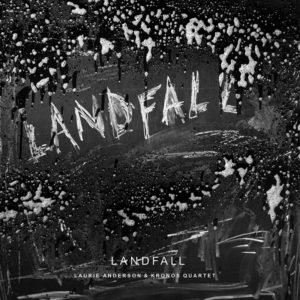Marketplace
2018 Nonesuch Records PRESSING
- Catalog Number 564164-1
- Release Year 2018
- Vinyl Mastering Engineer Robert C. Ludwig
- # of Disks 2
- Jacket Style Single
When listening to this album I think of this band or music:
Laurie Anderson’s most recent multimedia projects—Landfall and 2015’s Heart of a Dog—may be most accurately described as soundtracks. Each serves as an aural accompaniment to a larger cinematic or live presentation. But the more time one spends with the two works, it seems she’s increasingly out to redefine theater. While Landfall doesn’t qualify as Broadway or even a radio play, Anderson should be thought of less as an experimental artist and more as a storyteller.
I would listen to this album while:
A night out at the theater gets pricey. A night in with Landfall is far more affordable. Inspired by the horrific disaster that was 2012’s vicious Hurricane Sandy, Anderson doesn’t present a documentary but instead creates a thoughtful reflection on loss. It’s a project worth revisiting, particularly since Anderson’s abstract and free-form essay-like reads remain open to multiple interpretations. Nonesuch’s 2LP vinyl pressing—distinguished with liquid strings, galactic spaciousness, intimate vocals, and black backgrounds—further encourages an evening spent in front of a private stereo or home theater.
Music from this album would be a great soundtrack to:
Landfall seeks to put tragedy in perspective and illuminate the ways in which we are helpless. When you are in need of a deep breath, and feel-better platitudes won’t do the trick, this is the soundtrack for your thoughts. As Anderson declares midway through the album, “Being in your head is like being in a huge drafty barn.” Give that internal shed some music.
Landfall teems with contrasts. The opening tracks, which unfold largely sans Anderson and focus on the violin work of Kronos Quartet, immediately put the listener on edge. They are sharp, piercing numbers, on which strings are quickly struck and notes become drawn out. The track names play it simple—“CNN Predicts a Monster Storm” and “The Water Rises”—to capture fear in the same manner as a newspaper headline. Yet there’s life beyond the news alert. “The Water Rises,” for instance, unfolds with a hypnotic tick-tock serving as the rhythm, hinting at slow inevitability as swaying violins mourn while a piano tries to soothe the anxiety. Anderson soon describes Hurricane Sandy as if viewing it from orbit, instantly raising a question: Is Kronos Quartet capturing human unease at the impending storm or setting out to create a persona for the monstrous cyclone?
Anderson herself drifts in and out. On album, without the benefit of seeing her and the Kronos Quartet perform it live with carefully choreographed imagery, the effect is one of Anderson appearing as a ghost on her own work. Yet her soothing voice feels well-suited to letting listeners’ imaginations run wild. We never sense if Anderson is annoyed or mesmerized. She narrates in the comforting tones of a Siri or Alexa. (Indeed, throughout her career, Anderson has blurred the lines between humanity and technology.) Some of her stories seem odd. She professes boredom at hearing the dreams of another and tells us of a busted karaoke machine in a “Dutch dive bar.” They are small daily annoyances in the face of the awesome power of nature, and one could write a dissertation on whether Anderson tries to create an escape or illustrate perspective.
As Landfall progresses, Anderson’s words become less abstract even as the music becomes increasingly and wildly adrift. See the Morse Code-like arrangement of “We Learn to Speak Yet Another Language” or distorted bellowing of “If Twisted the Street Signs.” Electronics also grow more pronounced, with the Pong-like bounce of “We Head Out” emerging after the looped scratches of “Helicopters Hang over Downtown.” Anderson juxtaposes it all with thoughts on animals that have gone extinct as well as the moment she noticed her Manhattan home flooded, destroying many of her possessions. As she recounts surveying her once-prized artifacts, now worthless and water-logged junk, there’s no anger or panic. “How beautiful,” she says, as if suddenly free.
Landfall


 4
4